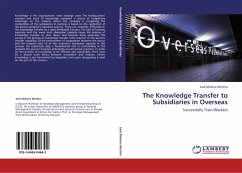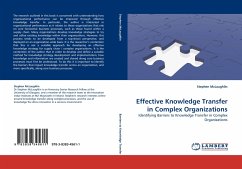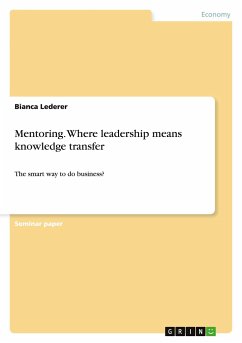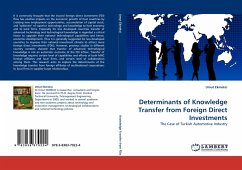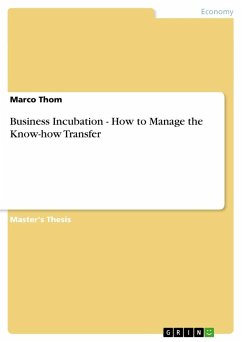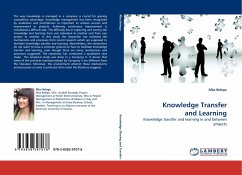Diploma Thesis from the year 2000 in the subject Business economics - Business Management, Corporate Governance, ESCP Europe Business School - Campus Berlin (Unbekannt), language: English, abstract: Inhaltsangabe:Abstract:
The main question investigated in this European Research Project is whether corporate culture presents the biggest obstacle to knowledge management. To better answer this question two sub-questions are formulated: How does corporate culture influence the transfer of knowledge? and What are the key elements in a corporate culture that facilitate the process of knowledge transfer?
In order to answer these questions this study contains three parts: the literature review, the field research, and analysis and discussion.
The literature review explains the concepts of knowledge management and culture, discussing the relevant theories to each of the two. In the second part the methodology as well as the research site are stated and justified. Subsequently the results of the four case studies conducted are presented. The third part of this study analyses and interprets the findings with reference to the literature in order to answer the research questions. The limitations of the study will be discussed and recommendations for further research are offered. Last but not least, implications for the professional practice are pointed out.
Corporate culture clearly influences the transfer of knowledge. This influence is exerted by some key elements as proposed by T. Davenport and L. Prusak (1998), such as trust between the knowledge provider and the knowledge receiver, shared language, (un)structured time and meeting places, the willingness to share, the willingness to apply 'foreign' knowledge, and the willingness to judge knowledge objectively. This research confirms that these elements are indeed vital and no additional elements could be identified.
However, some components seem to be more influential than others. It is likely that their relative importance varies according to the industry investigated. Elements which do not pose any problems in the consulting industry, such as the willingness to apply 'foreign' knowledge and the objective judgement of knowledge, could probably present significant problems in other industries. It is advisable to look at these elements independently from the research site.
According to these elements, the consulting industry is generally judged to be conducive to the transfer of knowledge, the obstacles faced in this industry appear to be of a more operational nature. This appears to be an evolutionary process. In the beginning corporate culture presents the main obstacle to knowledge management. With time, other challenges emerge which are more and more operational.
Furthermore, corporate culture is not the only component that influences the transfer of knowledge. Instead its influence is shared with other main components. Some that could be identified are strategy, technological infrastructure, and processes. The relationship among these is very strong. All of them must be dealt with, one alone will not be sufficient.
Among these corporate culture is probably the most complex and needs constant attention. However, the conclusions drawn from the field research indicate that corporate culture in the consulting industry is, in principle, very favourable to knowledge management and does not represent the biggest obstacle to knowledge management. The biggest obstacle to knowledge management in the consulting industry is the harmonisation of all the necessary elements (corporate culture, technology, processes, and strategy). The latter is an obstacle which is operational but not fundamentally connected to corporate culture.
Inhaltsverzeichnis:Table of Contents:
Introduction1
1.literature review6
1.1knowledge management6
1.1.1Introduction6
1.1.2Data7
1.1.3Information8
1...
Hinweis: Dieser Artikel kann nur an eine deutsche Lieferadresse ausgeliefert werden.
The main question investigated in this European Research Project is whether corporate culture presents the biggest obstacle to knowledge management. To better answer this question two sub-questions are formulated: How does corporate culture influence the transfer of knowledge? and What are the key elements in a corporate culture that facilitate the process of knowledge transfer?
In order to answer these questions this study contains three parts: the literature review, the field research, and analysis and discussion.
The literature review explains the concepts of knowledge management and culture, discussing the relevant theories to each of the two. In the second part the methodology as well as the research site are stated and justified. Subsequently the results of the four case studies conducted are presented. The third part of this study analyses and interprets the findings with reference to the literature in order to answer the research questions. The limitations of the study will be discussed and recommendations for further research are offered. Last but not least, implications for the professional practice are pointed out.
Corporate culture clearly influences the transfer of knowledge. This influence is exerted by some key elements as proposed by T. Davenport and L. Prusak (1998), such as trust between the knowledge provider and the knowledge receiver, shared language, (un)structured time and meeting places, the willingness to share, the willingness to apply 'foreign' knowledge, and the willingness to judge knowledge objectively. This research confirms that these elements are indeed vital and no additional elements could be identified.
However, some components seem to be more influential than others. It is likely that their relative importance varies according to the industry investigated. Elements which do not pose any problems in the consulting industry, such as the willingness to apply 'foreign' knowledge and the objective judgement of knowledge, could probably present significant problems in other industries. It is advisable to look at these elements independently from the research site.
According to these elements, the consulting industry is generally judged to be conducive to the transfer of knowledge, the obstacles faced in this industry appear to be of a more operational nature. This appears to be an evolutionary process. In the beginning corporate culture presents the main obstacle to knowledge management. With time, other challenges emerge which are more and more operational.
Furthermore, corporate culture is not the only component that influences the transfer of knowledge. Instead its influence is shared with other main components. Some that could be identified are strategy, technological infrastructure, and processes. The relationship among these is very strong. All of them must be dealt with, one alone will not be sufficient.
Among these corporate culture is probably the most complex and needs constant attention. However, the conclusions drawn from the field research indicate that corporate culture in the consulting industry is, in principle, very favourable to knowledge management and does not represent the biggest obstacle to knowledge management. The biggest obstacle to knowledge management in the consulting industry is the harmonisation of all the necessary elements (corporate culture, technology, processes, and strategy). The latter is an obstacle which is operational but not fundamentally connected to corporate culture.
Inhaltsverzeichnis:Table of Contents:
Introduction1
1.literature review6
1.1knowledge management6
1.1.1Introduction6
1.1.2Data7
1.1.3Information8
1...
Hinweis: Dieser Artikel kann nur an eine deutsche Lieferadresse ausgeliefert werden.


